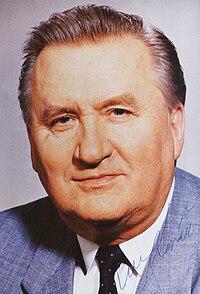Michal Kováč
| Michal Kováč | |
|---|---|
 |
|
| 1st President of Slovakia | |
|
In office 2 March 1993 – 2 March 1998 |
|
| Preceded by | Office created |
| Succeeded by | Rudolf Schuster |
| 7th Chairman of the Federal Assembly of Czechoslovakia | |
|
In office 25 June 1992 – 31 December 1992 |
|
| Preceded by | Alexander Dubček |
| Succeeded by | office abolished |
| Finance Minister of Slovak Federal Republic | |
|
In office 12 December 1989 – 17 May 1991 |
|
| Preceded by | -??- |
| Succeeded by | Anton Vavro (acting) |
| Personal details | |
| Born |
5 August 1929 Ľubiša, Czechoslovakia |
| Died | 5 October 2016 (aged 87) Bratislava, Slovakia |
| Spouse(s) | Emília Kováčová |
Michal Kováč (5 August 1929 – 5 October 2016) was the first President of Slovakia, having served from 1993 through 1998.
Kováč was born in the village of Ľubiša in then Czechoslovakia in 1930. He graduated from the present-day University of Economics in Bratislava and was a bank employee of the Státní banka československá and of other banks. As such, he spent some years in London and in Cuba in the 1960s. During the Normalization he was subject to some persecution.
During and after the Velvet Revolution, from 12 December 1989 to 17 May 1991 (when he resigned) Kováč was the Finance Minister of the Slovak (Socialist) Republic.
In early 1991, he was one of the founders and the vice-chairman of the Movement for a Democratic Slovakia. As such, he was elected as a deputy to the Federal Assembly of Czechoslovakia in 1990. After the 1992 election he served as the Chairman of the Federal Assembly from 25 June to 31 December 1992. He played an important role in the process of the preparation of the Dissolution of Czechoslovakia.
Kováč was elected president by the National Council of Slovakia in February 1993 (because he was a candidate of the biggest parliamentary party—the Movement for a Democratic Slovakia) and inaugurated on 2 March 1993. He soon became a strong opponent of Prime Minister Vladimír Mečiar and by giving a critical presidential address to parliament in March 1994, Kováč significantly contributed to the deposition of the then Mečiar government and the creation of the Moravčík government (which only lasted until the next parliamentary election in the autumn of 1994).
...
Wikipedia
